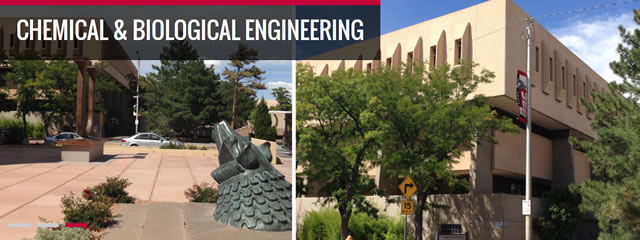
Chemical and Biological Engineering ETDs
Publication Date
Spring 4-16-2019
Abstract
Developing hybrid catalytic systems has been researched for the past decade in an effort to efficiently incorporate catalysts of different modalities in catalytic cascades. It has become imperative to design a cascade system where the catalysts are spatially organized to control the delivery of precursors, intermediates, and products. In this work, we have shown that a molecular catalyst, biocatalyst, and metallic catalyst can be co-localized using a carbonaceous support to create a hybrid catalytic system and complete the oxidation of oxalic acid to create a microchemical reactor. The molecular, pyrene-TEMPO catalyst oxidizes glyoxalic acid to oxalic acid. The enzyme oxalate decarboxylase from Bacillus Subtilis is being used to convert oxalic acid to formic acid followed by formic acid oxidation to CO2 by the metallic catalyst, gold nanoparticles. This work continues to demonstrate incorporating these three catalysts of these three distinct modalities on the same support to catalyze a three-step catalytic reaction as a fundamentally new result. Finding the optimal ways to incorporate three catalysts with different modalities on the same support is expected to lead to the novel pathways in the design of synthetic multi-step cascade reactions towards the development of microchemical reactors.
This work is a contribution to the fundamental science behind developing hybrid catalysts of distinctly different modalities and their use in multi-step catalytic reactions. One of the main technical contributions of this work in creating a synthetic catalytic cascade was by immobilizing metallic nanoparticles, molecular redox catalysts, and an enzyme in the same carbonaceous support and demonstrating the synergistic effect of their co-presence in an overall catalytic reaction enhancement. This research opens paths to develop and engineer more complex synthetic hybrid catalysts for larger multi-step cascade reactions as well as the development of more sophisticated microchemical reactors, which include using different catalysts and different alternative fuels.
Keywords
hybrid catalyst, metabolon, enzymatic catalyst, molecular catalyst, nanoparticles
Document Type
Dissertation
Degree Name
Chemical Engineering
Level of Degree
Doctoral
Department Name
Chemical and Biological Engineering
First Committee Member (Chair)
Plamen Atanassov
Second Committee Member
Fernando Garzon
Third Committee Member
Ivana Matanovic
Fourth Committee Member
Andrew Shreve
Fifth Committee Member
Mehran Tehrani
Recommended Citation
Chavez, Madelaine Seow. "Metabolon-Inspired Design of Multi-Modal Catalytic Cascade." (2019). https://digitalrepository.unm.edu/cbe_etds/78
